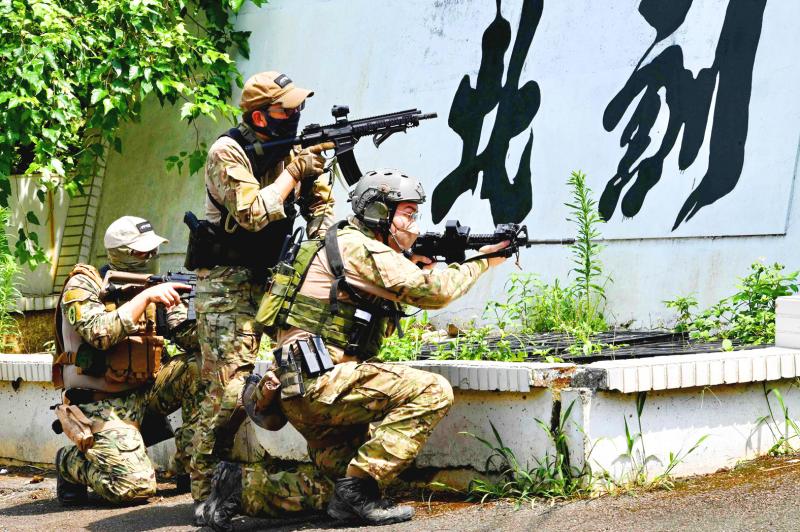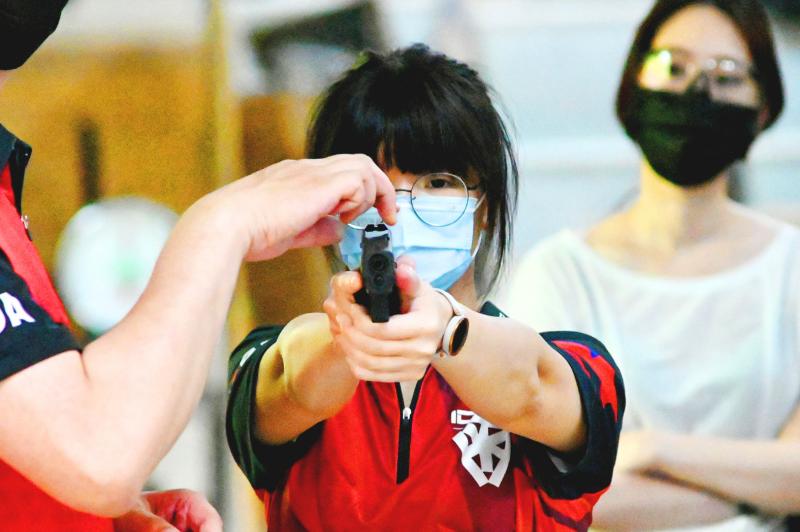Dressed in military camouflage with an assault rifle ready, “prof” Yeh peers from behind a vehicle in a parking lot outside Taipei, scanning his surroundings and waiting for a signal to advance.
Yeh actually works in marketing, and his weapon is a replica — but he is spending the weekend attending an urban warfare workshop to prepare for what he sees as the very real threat of a Chinese invasion.
“The Russia-Ukraine war is a big reason why I came to this workshop,” 47-year-old Yeh, whose call sign during training is prof”, told Agence France-Presse (AFP) during a break between sessions.

Photo: Sam Yeh, AFP
When Russian President Vladimir Putin ordered his troops to invade Ukraine at the end of February, he gave shape to the darkest fears of many Taiwanese.
The nation lives under constant threat from authoritarian China, which views it as part of its territory and has pledged to take it one day.
However, the war in Ukraine has also inspired Yeh.

Photo: Sam Yeh, AFP
The resilience of Ukrainian forces has given him hope that with the right tactics, Taiwan might also have a chance defending itself against its much mightier neighbor.
He is not alone — the organizers of the urban combat course say their students have nearly quadrupled since February. Firearms and first aid courses have also seen increased enrolment.
Disquiet over China was brewing in Taiwan long before the Russian invasion.
Max Chiang, CEO of the company that organizes the workshops, said there has been “a heightened sense of crisis” among Taiwanese since 2020, when Chinese warplanes began making regular incursions into the nation’s air defense identification zone.
About 380 sorties were recorded that year — a number that more than doubled last year and is on track to do so again this year, an AFP database showed.
China comprehensively outnumbers Taiwan’s militarily, with more than 1 million ground force personnel to Taiwan’s 88,000, as well as 6,300 tanks compared with 800 and 1,600 fighter jets to 400 jets, US Department of Defense data showed.
However, Ukraine has provided a practical blueprint for how to make that disparity matter less. It has vividly demonstrated how fighting for control of cities can be difficult and costly for attacking forces — and most of Taiwan’s 23 million people live in urban areas.
As Yeh and his 15 teammates run in staggered column formation across the parking lot, stooping behind dilapidated buildings and vehicles to simulate attacks on enemy positions, they are trying to put some of the lessons learned in Ukraine’s devastated cities into practice.
“The best defense is offense,” Yeh said as instructors in bright reflective vests stand nearby taking notes.
“To put it bluntly, annihilate the enemy and stop any enemy advances,” he said.
In a warehouse beside the parking lot, 34-year-old Ruth Lam is learning to fire a handgun for the first time.
Lam, who works at an emergency vehicle lights manufacturer, said that most of her European clients had told her there would not be a war in Ukraine.
“But it happened,” she said.
She is hoping that knowing how to handle a gun might protect her and her family if China were to start a war, and is planning to continue target practice with friends.
“Prepare your umbrella before it rains,” she said. “We don’t know when things are going to happen.”
A survey conducted in May showed that 61.4 percent of respondents said they were willing to take up arms in the event of an invasion.
“The will of the Ukrainian people to fight against aggressors has increased the resolve of Taiwanese to safeguard their homeland,” Taiwan NextGen Foundation chief executive officer Chen Kuan-ting (陳冠廷) said.
Lin Ping-yu, a former paratrooper who came to the urban warfare class “to brush up on his combat skills,” concurs.
“Only when a country’s citizens have the strong will and determination to protect their land can they convince the international community to come help them,” the 38-year-old said.
Yeh believes it is a question of when, not if, they would be called to put their new skills into action.
Citing the example of Hong Kong, where Beijing has moved to consolidate its grip in the past few years, he simply said: “Taiwan is next.”

Alain Robert, known as the "French Spider-Man," praised Alex Honnold as exceptionally well-prepared after the US climber completed a free solo ascent of Taipei 101 yesterday. Robert said Honnold's ascent of the 508m-tall skyscraper in just more than one-and-a-half hours without using safety ropes or equipment was a remarkable achievement. "This is my life," he said in an interview conducted in French, adding that he liked the feeling of being "on the edge of danger." The 63-year-old Frenchman climbed Taipei 101 using ropes in December 2004, taking about four hours to reach the top. On a one-to-10 scale of difficulty, Robert said Taipei 101

Nipah virus infection is to be officially listed as a category 5 notifiable infectious disease in Taiwan in March, while clinical treatment guidelines are being formulated, the Centers for Disease Control (CDC) said yesterday. With Nipah infections being reported in other countries and considering its relatively high fatality rate, the centers on Jan. 16 announced that it would be listed as a notifiable infectious disease to bolster the nation’s systematic early warning system and increase public awareness, the CDC said. Bangladesh reported four fatal cases last year in separate districts, with three linked to raw date palm sap consumption, CDC Epidemic Intelligence

Taiwanese and US defense groups are collaborating to introduce deployable, semi-autonomous manufacturing systems for drones and components in a boost to the nation’s supply chain resilience. Taiwan’s G-Tech Optroelectronics Corp subsidiary GTOC and the US’ Aerkomm Inc on Friday announced an agreement with fellow US-based Firestorm Lab to adopt the latter’s xCell, a technology featuring 3D printers fitted in 6.1m container units. The systems enable aerial platforms and parts to be produced in high volumes from dispersed nodes capable of rapid redeployment, to minimize the risk of enemy strikes and to meet field requirements, they said. Firestorm chief technology officer Ian Muceus said

MORE FALL: An investigation into one of Xi’s key cronies, part of a broader ‘anti-corruption’ drive, indicates that he might have a deep distrust in the military, an expert said China’s latest military purge underscores systemic risks in its shift from collective leadership to sole rule under Chinese President Xi Jinping (習近平), and could disrupt its chain of command and military capabilities, a national security official said yesterday. If decisionmaking within the Chinese Communist Party has become “irrational” under one-man rule, the Taiwan Strait and the regional situation must be approached with extreme caution, given unforeseen risks, they added. The anonymous official made the remarks as China’s Central Military Commission Vice Chairman Zhang Youxia (張又俠) and Joint Staff Department Chief of Staff Liu Zhenli (劉振立) were reportedly being investigated for suspected “serious